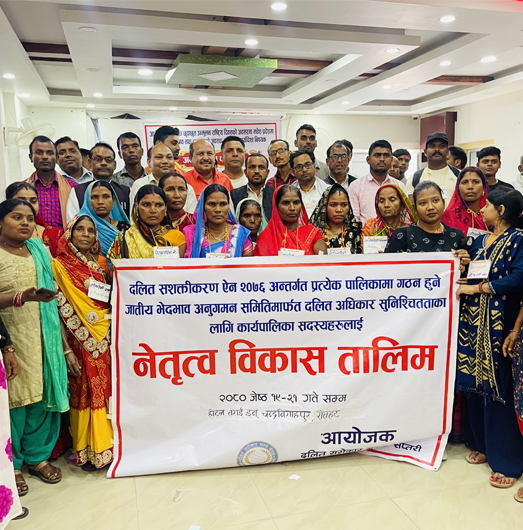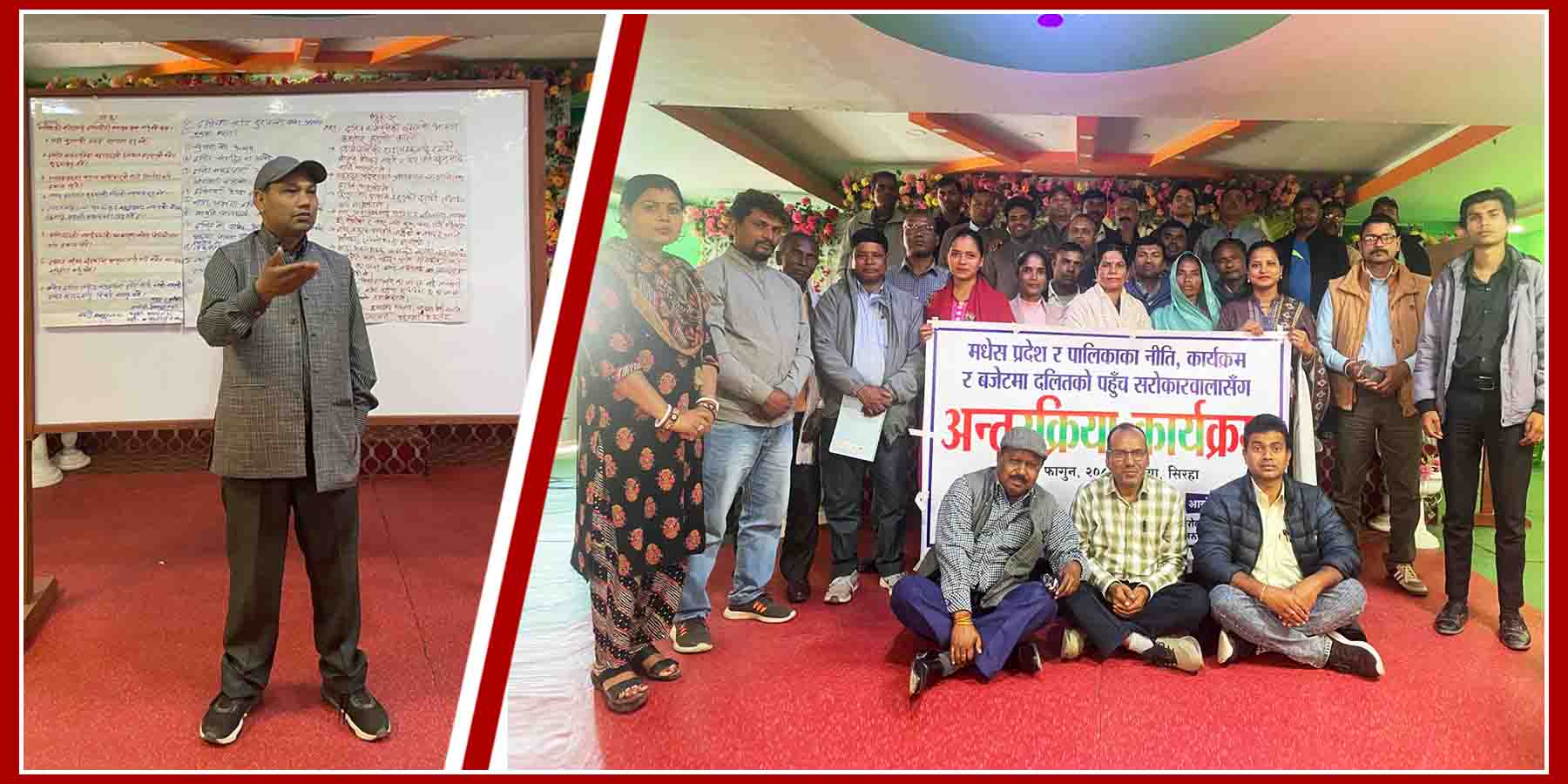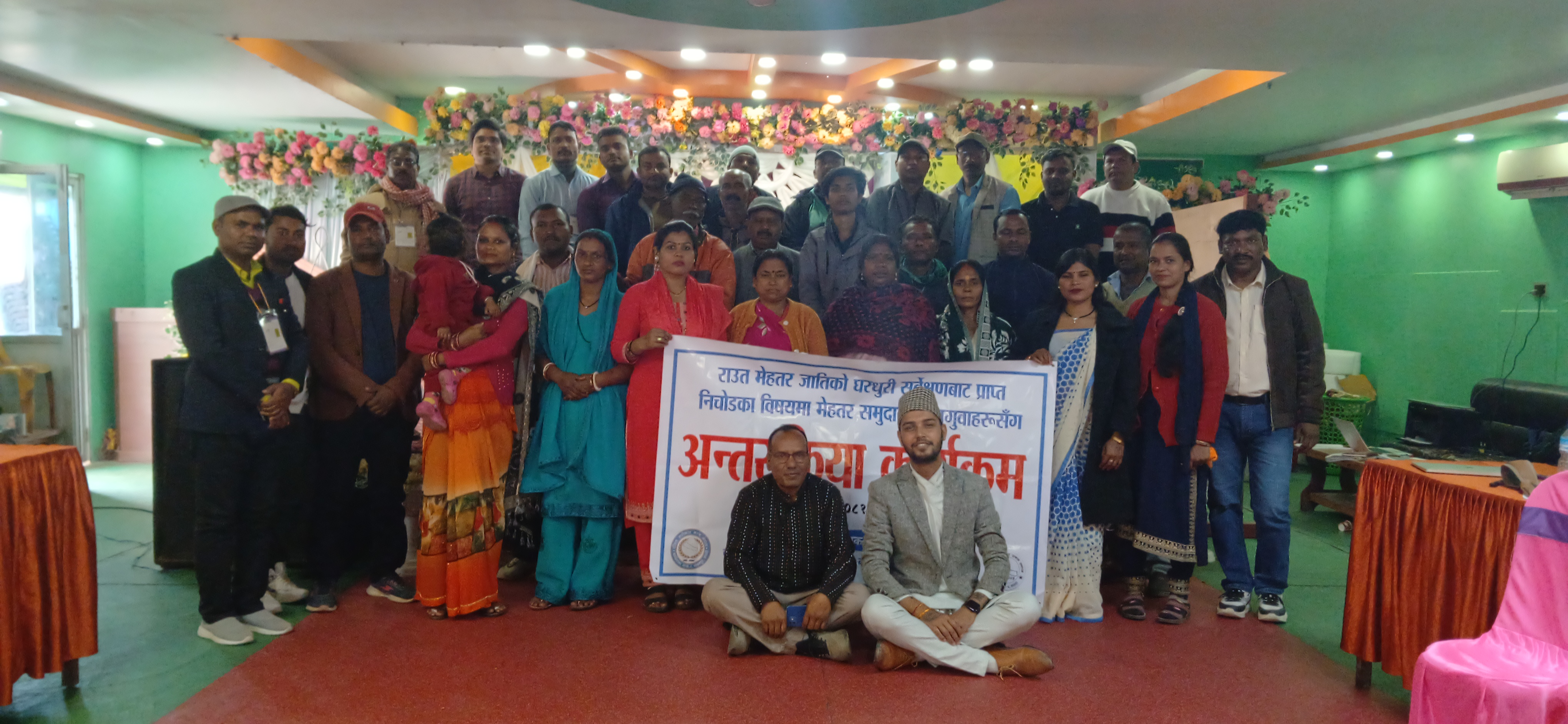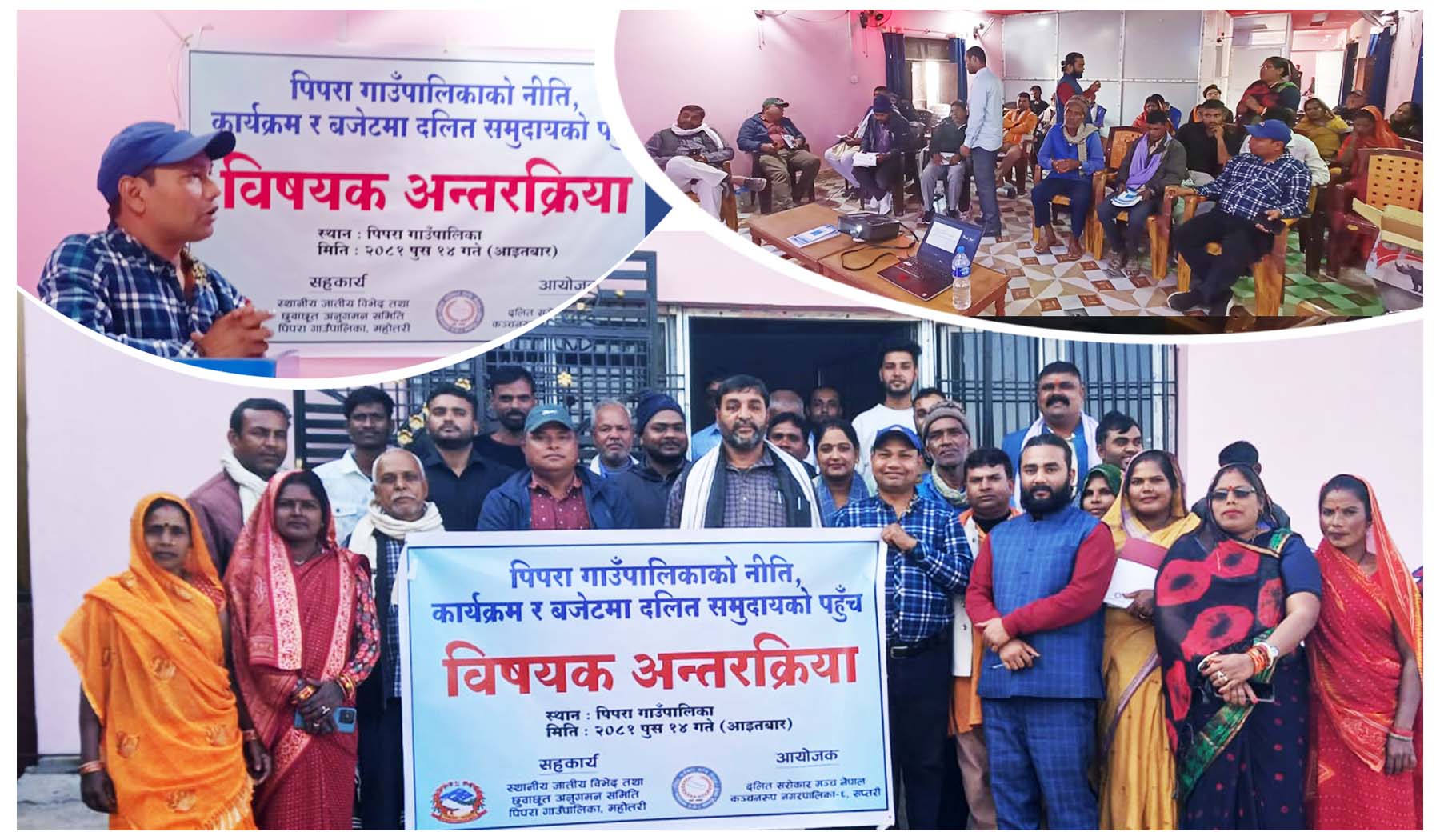..
About Us
Dalit Sarokar Manch Nepal (DSMN), also known as the Forum for Dalit Concern, is dedicated to liberating Dalits from discrimination and creating a society based on equality. DSMN operates primarily in the Madhesh Province, where the Dalit population faces significant caste based discrimination. Although based in Kanchanrup of the Saptari district, DSMN's influence extends throughout the entire province and beyond, addressing issues on a national scale through advocacy and media engagement.
DSMN's unique approach of "advocacy based on facts" sets it apart from other organizations. This method has earned DSMN significant recognition and media coverage, including from Kathmandu based mainstream media. The provincial government also regards DSMN's findings as critical references for policymaking. DSMN remains committed to continuing its distinctive advocacy work, aiming to raise awareness and address issues of equality more robustly.
DSMN has successfully positioned itself as a vital force for social change, championing the rights of Dalit communities and striving to create an inclusive and equitable society. The organization employs a multifaceted strategy to tackle the systemic issues faced by Dalits, encompassing education, economic empowerment, health and wellbeing, and environmental sustainability.
Vision
To create a society where all Dalit individuals live with dignity, equality, and full participation in social, economic, and political life.
Mission
To empower the Dalit community through rigorous research, evidence based advocacy, and comprehensive development programs. Our mission encompasses a rights based approach focused on dismantling systemic discrimination, enhancing economic opportunities, improving health and education outcomes, and fostering environmental stewardship. We aim to create sustainable change by equipping Dalits with the skills, knowledge, and resources needed to thrive.
Goal
To ensure that Dalits across the Madhesh Province are socially integrated, economically empowered, and politically represented. We strive to create an environment where Dalits can fully exercise their rights, access essential services, and contribute to society as equal members. Our goal is to build a cohesive community where Dalit individuals can achieve their full potential and live dignified lives.
Objectives
- Research and Advocacy: Conduct comprehensive studies and research to uncover the causes of social discrimination, poverty, human rights violations, and other systemic issues. Publish findings and run programs to address these problems.
- Development Programs: Implement initiatives in social justice, security, education, health, habitat, employment, environment protection, agriculture, food security, and drinking water. Foster relationships with government bodies, political parties, and national and international organizations to support these programs.
- Gender Equality and Social Inclusion: Develop programs to ensure state agencies address issues of women, Madhesi, Dalits, marginalized communities, and disabled individuals, focusing primarily on Madhesi Dalits.
- Community Unity and Rights Protection: Promote unity among various ethnic communities, uphold social justice, and protect constitutional and legal rights.
- Skill Training and Youth Programs: Offer skill training related to microfinance and livelihoods to combat youth unemployment. Implement youth focused programs addressing drug control, formal and informal education.
- Human Rights Monitoring: Monitor and report on human rights violations. Publish magazines and annual reports on these incidents, and run awareness programs on local resources, state services, decentralization, and good governance.
- Land and Agriculture Advocacy: Identify and address issues related to the right to food, land, and agriculture. Run awareness and organization programs among marginalized farmers and landless squatters.
- Antiviolence Initiatives: Advocate against child labor, violence against women, and domestic violence, holding perpetrators accountable.
Values
- Leadership on Key Issues: Led by those who are directly affected
- Fact-based Advocacy: Grounded in accurate and reliable data.
- Joint Campaigns: Collaborate on shared concerns.
- Social Justice: Strive for a society without discrimination.
- Support for Marginalized Communities: Advocate for the boycotted and marginalized.
- Human Rights Framework: Operate within human rights principles.
- Democratic Values: Uphold democracy and transparency.
- Volunteerism: Promote a volunteer spirit.
- Credibility and Integrity: Maintain trust and positive thinking.
- Rule of Law: Respect and enforce legal standards.
- Collaboration: Expand networks and partnerships.
- Solidarity: Stand together on rights issues.
- Participation Based Approach: Foster teamwork and community involvement.
Updated Initiatives for a Changing World
- Disaster Support: Provide immediate assistance and long-term recovery support to communities affected by natural disasters.
- Environmental Protection: Organize tree plantation drives and environmental awareness campaigns.
- Economic Empowerment: Focus on skill development and women empowerment through skill based training programs.
- Budget Analysis: Analyze budgets allocated to Dalit communities by local and provincial governments to ensure effective utilization and accountability.
Vision
Create a situation of living a dignified life for the people of Dalit community.
Mission
Create a situation of living a dignified life for the people of the Dalit community by carrying out studies, researches, and other activities with rights-based approach based on facts and through skill enhancement and empowerment campaign.
Goal
Create a situation of living a dignified life for the people of the Dalit community of Siraha and Saptari districts so that Dalits are socially integrated and accepted in the society by utilizing services and the right to representation as determined by the state in Siraha and Saptari.
Objective
- Conduct comprehensive studies and researches to find out the causes of increasing social discrimination, poverty, incidents of human rights violations, imbalanced development trends, and problems of economic, social, political, academic and cultural sectors, publish research reports and run different programs to resolve such problems.
- Run programs for the development in the sectors such as social justice and security, education, health, habitat, employment, environment protection, agriculture, food security, and drinking water by establishing good relations with government, political parties, national and international organizations. And, take initiatives to implement and enforce national and international conventions and agreements related to this.
- Run programs that make the state agencies address the issues of women, Madhesi, Dalits, marginalized poor Madhesi communities, backward Dalit communities, and disable people under the programs of gender equality and social inclusion. Work mainly for Madhesi Dalits.
- Run programs that help strengthen unity among various ethnic communities, and establish social justice and human dignity by protecting and promoting their constitutional and legal rights.
- Run programs of skill training related to microfinance and livelihood that help address problems of youth unemployment. Also run programs focused on youths (drug control, formal and informal education).
- Monitor incidents of human rights violations and publish magazines and annual reports related to such incidents. Run awareness programs on utilizing local resources on facilities and services to be provided by the state, decentralization and good governance.
- Identify issues by mapping and analyzing the situation of the right to food, land, and agriculture.
- Run awareness programs among marginalized farmers including landless squatters and organize them.
- Mount pressure on concerned authorities against child labor, violence against women and domestic violence and punish the culprits.
Values of the organization
- Leadership by the person who leads on the issue
- Advocacy based on facts
- Joint campaign on common issues
- Establishment of a society based on social justice without discrimination
- Advocacy in favor of the boycotted community
- Working system based on human rights
- Trust on democratic values/principles
- Good governance and transparency
- Attitude of volunteer
- Credibility
- Positive thinking
- Trust on rule of law
- Coordination, collaboration and relation expansion
- Solidarity in rights issues
- Networking for rights
- Participation-based working system
- Trust on teamwork






.jpeg)